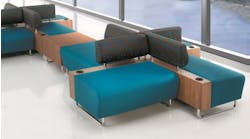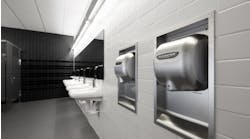Whether they're studying economics, engineering or English literature, students at Princeton University, N.J., have definitely learned one thing this school year: Make sure you have your student ID card with you.
Beginning last fall, students were required at all times of the day to have their ID-a computerized access-control card-to get into their residence halls and many of the campus' academic buildings.
"As of September, we locked down the doors 24 hours a day," says Barry Weiser, crime prevention specialist for the Department of Public Safety at Princeton University. "It took some negotiating with the students, but so far everybody seems comfortable with it."
Access-control cards are one of the technological advances available to beef-up security on campuses. As colleges and universities try to provide a safe environment for students and staff while maintaining the freedom and openness of a college campus, they continue to rely on traditional policing methods, but also are turning to technology-computerized alarm systems, electronic locks, video surveillance-to do the job.
"So many times people think we're an island here on campus," says Lt. Doug Main of the Public Safety Department at the University of Northern Iowa, Cedar Falls. "It's a fallacy. We have few problems with people on campus, but the problem is when people outside the campus decide to come here."
Have your ID ready Princeton, as well as Duke University, Durham, N.C., uses an electronic-access system that requires an access card to unlock a door, and it also allows residents to use the telephone in their rooms to unlock the door and let a visitor into the building.
"It's been very helpful keeping folks out of [residence halls] who aren't authorized to be there," says Capt. Charles Nordan, uniform patrol commander for Duke's Public Safety Department.
Besides restricting access, the electronic system alerts authorities when someone is compromising security by propping a door open.
"Students still prop the doors," says Nordan, "but now we can send someone over and determine right away where it is and why it's being propped, instead of a door remaining open for several hours."
At Louisiana State University, Baton Rouge, all of the women's residence halls, and many of the men's units, have electronic locks and access-control cards for entry.
"The students like it," says Capt. Mark Shaw, special services commander with the LSU Police Department. "Now they can get in easier at night. They don't have to stand outside waiting for someone to let them in. They have 24-hour access."
Princeton's card-access system is in place in all residence halls, and is gradually being installed in administrative and academic buildings, as well. The university has had the system for several years, but until last year, it did not restrict entry at most buildings during daylight hours. The decision to enhance security at Princeton is not linked to any specific incident or trend.
"We said, 'Why not do it?'" says Weiser. "We try to be proactive. We have the capabilities to do what we really want to do, which is to deter crime at any time. It's been a strong deterrent."
School officials had to overcome the qualms of students who were concerned about the "big-brother" aspects of the technology and the potential restrictions of their freedom.
"One thing that helped," says Weiser, "is that a student uses one ID card for getting into the [residence hall], for the library, and for food service. That makes it more convenient."
The technology offers flexibility to take into account special circumstances or activities at a building, such as move-in day, when doors might be propped open for legitimate reasons.
"You can program the system any way you want to," says Nordan. "For instance, my card is programmed to give me carte blanche to get into any building."
Of course, no system is fail-safe, and people can still gain entry to a building by tailgating immediately behind someone who has legitimate access, or by banging on the door until a sympathetic student lets them in.
But as a whole, the system makes a campus safer, says Weiser.
"You're not going to get someone standing there in front of a [residence hall] trying to pry open a door," says Weiser. "We don't have to run as many suspicious characters out of the buildings."
Smile: you're on camera Princeton is considering other technologies to increase campus security.
"We're going to be looking at web cameras in areas such as parking lots, stadiums, other public venues-any location where money changes hands," says Weiser.
LSU is about to install closed-circuit cameras in the parking lots outside its five largest residence halls. Without the video surveillance, the police department relied on plainclothes officers to patrol the lots. That system was effective in fighting crime, but labor-intensive.
"The cameras will allow us to monitor the parking lots from the police station, with one officer instead of five," says Shaw. "We can turn on the videotape if there is trouble, and we even zoom in to get license numbers if we need to."
More pedestrian efforts But security doesn't have to be cutting-edge technologically to be effective. One of the more popular features of many campus police departments is a bicycle patrol unit.
"It makes the officer more approachable and makes the campus more accessible," says Main, who supervises the bicycle patrol unit at the University of Northern Iowa. "It puts the officer into the students' realm. College-age kids love bikes. Plus, campuses usually aren't conducive to patrol cars. There are a lot of pedestrian areas that cars can't get to."
Schools typically have emergency telephones installed strategically throughout their campuses, and many provide free shuttle buses or walking escorts for students who are traveling across campus after dark.
"In our Safewalk program, we have student teams that accompany students at night," says Mike Gruber, security supervisor for the Police Department at the University of Wisconsin, Madison. "They have radios, and they have undergone training before they become escorts."
Let there be light The Madison campus, like many colleges and universities, pays close attention to lighting.
"We do a quarterly lighting survey to determine how much light is enough, if it's in the right place, to see what kinds of lighting could be more efficient and effective," says Gruber.
At night, Wisconsin encourages pedestrians on campus to use a network of well-lighted sidewalks that it designates as "The Lightway," with reflective logos placed on light poles along the path. The paths typically are near campus buildings that are used heavily after dark.
At LSU, the campus has inherited streetlights that formerly illuminated an interstate highway. They are being installed to provide lighting in a part of the campus where expansion is beginning to occur, says Shaw.
The University of Northern Iowa's Public Safety Department has figured out a way to get students more aware and concerned about security on campus. Last fall, officers intrigued them with a spoof of one of their favorite TV shows, The X-Files, and enticed them with the promise of free pizza.
The result, says UNI Public Safety Lt. Doug Main, was The S-Files, a contest that taught hundreds of students important information about safety on the Cedar Falls campus.
"It's just a different way of training students to make them better informed," says Main.
The school's web page describes the S-Files as "inventive conspiracy to inform the members of the UNI community of the evil forces-theft, fire, violence and others-arrayed against them."
Students were asked to answer questions about campus safety, such as the legal blood-alcohol limit in Iowa, whether hot plates are allowed in residence-hall rooms, and the public safety department's emergency phone number.
The house with the most participating students in each of UNI's residence halls won 10 free pizzas. And the school won the Safety Program of the Year Award from the Midwest Region of the Association of College and University Housing Officers, awarded for the S-Files program.
To read about the S-Files program on the World Wide Web, go to www.uni.edu/pubsaf/commserv/sfiles.html.

